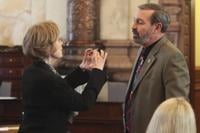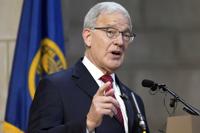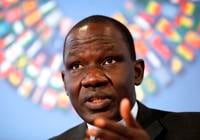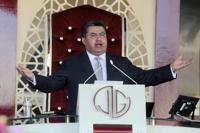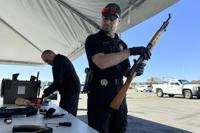TOPEKA, Kan. (AP) — A deep split among Republican lawmakers in Kansas on Tuesday doomed proposals from election conspiracy promoters to upend how the state conducts elections and also sank an effort with broader GOP support to shorten the time voters have to return mail ballots.
The state Senate rejected, a bill that would have banned remote ballot drops boxes and, starting next year, barred local election officials from using electronic machines to count ballots. Far-right Republicans across the U.S. have targeted drop boxes and advocated a return to hand-counting ballots, spreading that elections are rife with fraud and amplifying former President that the 2020 presidential election was stolen from him.
Republican senators added those provisions during a debate Monday to a bill that would have eliminated the three days after Election Day that Kansas voters have to return mail ballots to local election officials. Many Republicans argue that the grace period undermines confidence in the state’s election results, though there’s no evidence of significant problems from the policy.
Even if the GOP-controlled Senate had approved the bill, Republicans in the GOP-controlled House saw no chance that the provisions on vote-tabulating machines and ballot drop boxes would pass there.
Ending the grace period for mail ballots was an iffy proposition by itself because Democratic Gov. Laura Kelly opposes the idea, and GOP leaders didn’t have the two-thirds majority necessary to override of a similar bill last year.
Still, some Republicans had hoped they could pass a narrow bill this year and keep the Legislature’s GOP supermajorities together to override a certain Kelly veto. GOP senators who voted no Tuesday said they would have supported a bill only ending the grace period and argued that the other proposals weren't vetted.
“It's a bridge too far for me to support,” said Sen. Ron Ryckman Sr., a Republican from western Kansas.
Eleven of the Senate's 29 Republicans joined all 11 Democrats in voting no, an unusual show of dissent within the GOP supermajority.
Kansas Secretary of State Scott Schwab had criticized the legislation after the Senate rewrote it Monday, saying the changes “further undermine voter confidence and compromise election integrity.” Schwab is a conservative Republican who has for the integrity of Kansas elections and promoted ballot drop boxes.
“It’s unfortunate that elected officials lack trust in the democratic system that brought them into office,” Schwab said in his statement.
Schwab is neutral on whether Kansas should eliminate the grace period. Lawmakers enacted the policy in 2017 over concerns that the U.S. Postal Service's processing of mail was slowing.
More than 30 states require mail ballots to arrive at election offices by Election Day to be counted, according to the ������ϲʹ������� Conference of State Legislatures, and their politics vary widely. Among the remaining states, the deadlines vary from 5 p.m. the day after polls close in Texas to no set deadline in Washington state.
Voting rights advocates argue that giving Kansas voters less time to return their ballots could disenfranchise thousands of them and particularly disadvantage poor, disabled and older voters and people of color.
In the House, the Republican Elections Committee's chair, Rep. Pat Proctor, said Monday that there's no appetite in the House for banning or ballot drop boxes.
“Kansans that are not neck-deep in politics — they see absolutely no issue with voting machines and, frankly, neither do I," he said.
During the Senate's debate, conservative Republicans brushed aside criticism that returning to hand-counting would take the administration of elections back decades. They also incorrectly characterized sent in November to election offices in Kansas and at least four other states — including some containing the dangerous opioid fentanyl — as ballots left in
“The pursuit toward safe and secure elections never rests and never ends," a conservative Republican from central Kansas who wrote the provision to bar vote-tabulating machines, said Tuesday in explaining his support of the bill.


